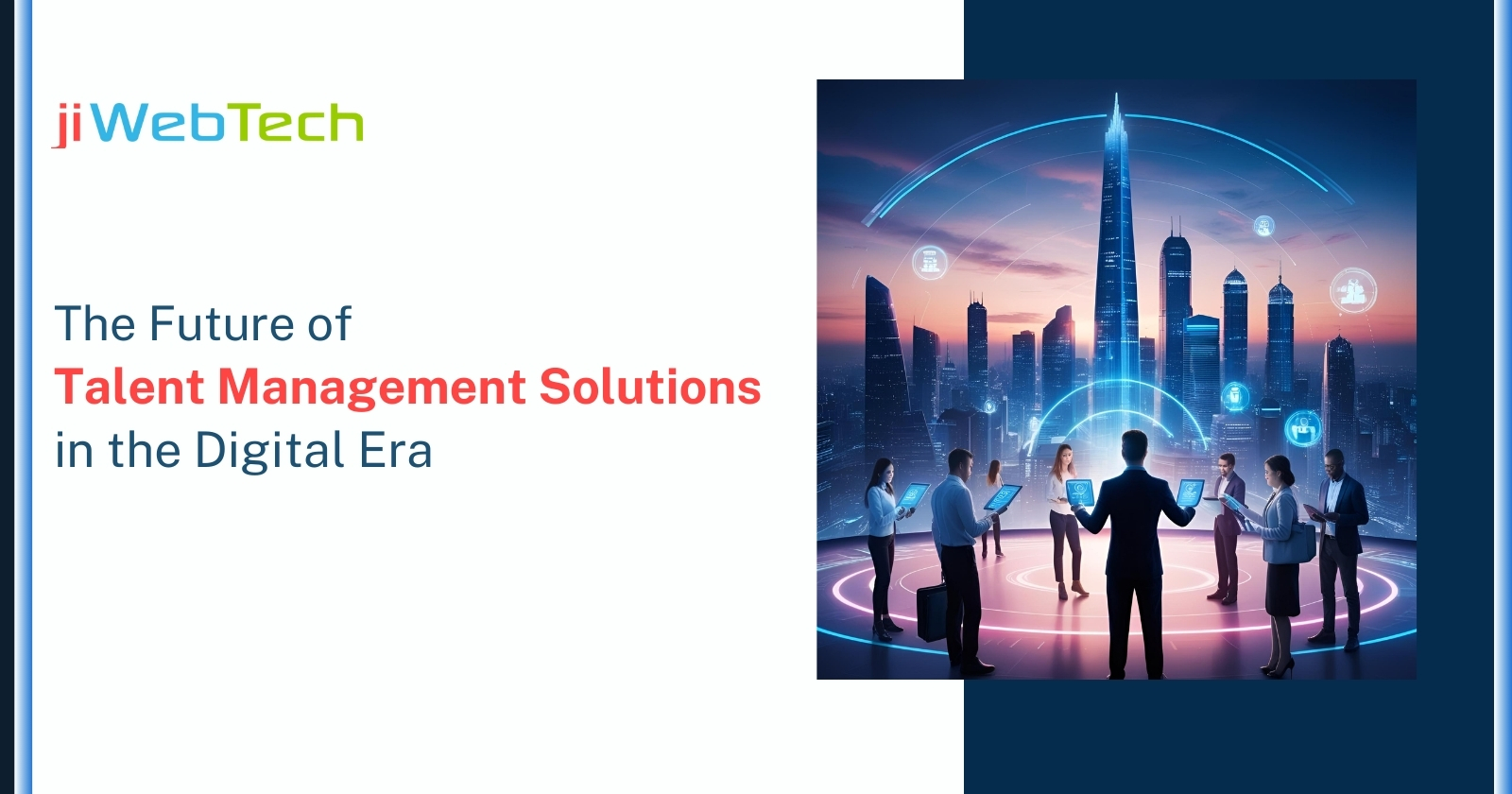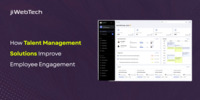- May 15, 2025
- Talent Management
- 2184
Share this post on:

The way businesses operate is changing very quickly these days. Because of this, companies can’t just use old-fashioned methods for managing their employees. Things are changing fast in the business world. Because of this, companies can't rely on old ways of handling their employees anymore. Now, businesses understand they need to use new technology to find good workers, help them do their jobs well, and keep them working for the company.
Talent management means everything from hiring new people to helping them learn and improve their work. As companies move more things online, talent management is changing to meet those needs. Things like artificial intelligence (AI), data analysis, and online platforms are becoming very important in helping businesses find excellent employees and make sure everyone is performing well.
Key Talent Management Trends
The business landscape is evolving quicker than ever before. Technological advancements, shifting demographics, and unpredictable economic climates are continuously reshaping how we work and, critically, who does the work. Talent is no longer just a cost; it's the engine of innovation, growth, and competitive advantage. Therefore, effective talent management isn't only a “nice-to-have”, it is crucial for any business.
1. Integration of AI and Automation
AI and automation are changing how companies find and manage employees in a big way. These AI tools help companies work faster and make better choices. The AI tools look at data to find the best talent for jobs based on their skills, experience, and what they could do. This helps companies hire people quickly and also helps employees move into different roles within the company that fit what the business needs enabling organizations to proactively address challenges.
2. Rise of Data-Driven HR Practices
Companies are the usage of information to make important decisions, and it's assisting them insucceed. The data shows how employees are doing, how happy they are, and why they might leave. These statistics enable HR teams to create unique plans for hiring, preparing future leaders, and helping employees get better. Looking at information to guess what capabilities will be needed later also helps companies plan their employees better.
3. Emergence of Virtual HR Departments
More people are working from home, so HR departments are now often online. These digital setups let companies manage employee information, benefits, and paychecks without needing an HR team in a physical office. Online HR helps companies work faster because employees can often handle paperwork themselves, and it also saves money on office space. This change also helps companies have employees in different locations by giving remote employees easy access to HR help. As more companies have a mix of in-person and remote work, online HR departments will be very important for keeping everyone connected.
4. Talent Ecosystems and Freelance Networks
The way people work is changing, with more focus on flexibility and specific skills. Businesses are now often using groups of temporary workers as part of their teams to find experts from everywhere. This lets companies respond quickly to changes in the market without paying for full-time employees. Using temporary workers with regular employees can encourage new ideas and still allow companies to easily get bigger or smaller.
5. Agile Performance Management
The usual yearly reviews of how employees are doing are now being replaced with new ways that focus on giving feedback and making improvements often. This change makes things more open and allows companies to change quickly, so employees can match their goals with what the business needs. These new ways of managing performance use technology to make paperwork easier and let teams change their goals as needed. This approach not only makes employees feel more involved but also helps companies get ready for problems.
6. Leadership Development for the Digital Era
Changes in technology have changed what leaders need to be good at, requiring new skills like understanding technology, being emotionally smart, and being able to change plans quickly. To help with this, companies are investing in programs to help leaders manage teams that work in different places and create new ideas. Computer programs that use AI provide personalized learning and quick feedback for leaders. Online coaching tools also help leaders improve by showing them real-world problems in workplaces that have both in-person and remote workers. These efforts make sure leaders are ready to handle difficult situations well.
7. Focus on Employee Experience
How employees feel about their jobs has become very important in how companies manage their teams. Today’s workers value being thanked, having the freedom to work how they want, and getting opportunities to learn, more than just getting a salary increase. Businesses are responding by building welcoming workplaces that focus on diversity, well-being, and career advancement. A company's reputation as an employer is important for attracting good employees by showing how much they care about these things. Businesses that focus on creating positive experiences for employees—from when they start a job to when they advance in their careers—are more likely to keep their best employees.
8. Internal Talent Marketplaces
Internal talent marketplaces are gaining traction as innovative platforms for workforce optimization. These systems enable employees to explore new roles within their organization based on skills and interests while helping managers identify internal candidates for critical positions. By promoting internal mobility, talent marketplaces reduce recruitment costs while enhancing employee satisfaction through career growth opportunities. This trend aligns with broader efforts to retain top talent in competitive industries.
9. Building Workforce Ecosystems
Workforce ecosystems include different ways of working—like full-time employees, freelancers, contractors, and gig workers—to create teams that can change and handle big projects. This shows how important it is to be flexible because the market can change quickly. Companies need to find ways to bring these different types of workers together smoothly and make sure they all work towards the same goals. Managing these ecosystems well means having good ways to communicate and using technology that helps people work together.
Conclusion
The future of how companies manage their teams will be shaped by using technology, using data to make decisions, and being able to change with how the workforce changes. Companies that use AI tools, flexible plans, virtual HR, and welcoming cultures will be better at attracting good employees and encouraging new ideas.
As the digital world keeps changing how businesses work around the world, keeping up with these trends will be important for success in how companies manage their teams. Businesses that focus on continuous learning, making employees feel good about their jobs, and developing leaders will do well even when things change—making sure their employees remain a strength in a constantly changing world.
jiWebTech provides top software that handles all parts of talent management, like checking skills, reviewing salaries, and organizing training. It makes work better by solving common HR problems. The software improves communication about HR updates and new job openings. Managers can use it to see real-time data, social feedback, and take quick actions, helping them lead their teams more effectively. It also lets HR share information interactively.
The software can be customized to fit company needs, making decisions easier, automating reports, and providing useful statistics. One of its best features is the EmployeePast tool, which makes checking employee history simple and efficient. Invest in our Talent Management Solution today.
FAQS
How does AI improve talent management?
AI can analyze candidate profiles more efficiently, match applicants to roles based on skill sets, predict employee turnover, and personalize training programs. It helps HR professionals make faster, more accurate decisions while improving the employee experience.
What role does data analytics play in talent management?
Data analytics provides insights into employee performance, engagement levels, training effectiveness, and retention risks. Organizations can use this information to make informed decisions and optimize their talent strategies.
Why is employee experience important in the digital era?
A positive employee experience improves retention, boosts productivity, and enhances company reputation. Digital tools help by offering real-time feedback, flexible work environments, and personalized development opportunities.
How can organizations prepare for the future of talent management?
Organizations can:
Embrace digital transformation
Invest in scalable HR technology
Focus on employee reskilling and upskilling
Use data to guide talent strategies
Foster a culture of continuous learning and innovation
Are there any challenges in adopting digital talent management solutions?
Yes, challenges may include:
High initial investment costs
Resistance to change from employees or HR teams
Data privacy and security concerns
Need for ongoing training and tech support
What are the benefits of cloud-based talent management systems?
Cloud-based systems offer:
Scalability
Real-time access from any device
Easy integration with other platforms
Reduced IT maintenance
Regular software updates and security patches









